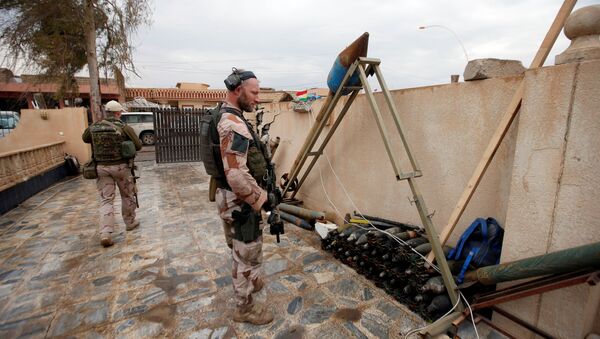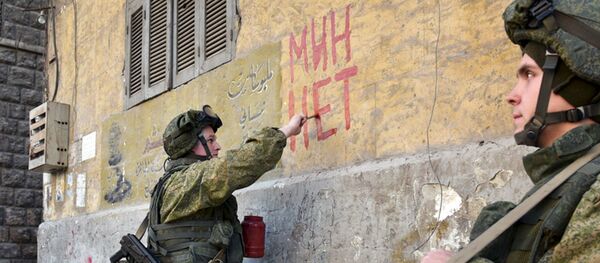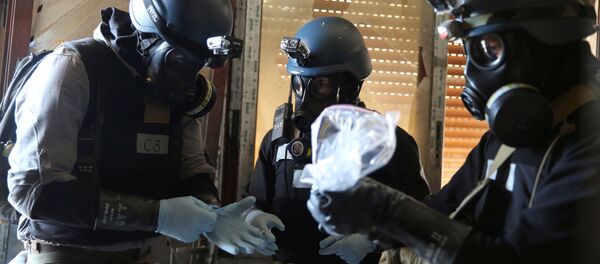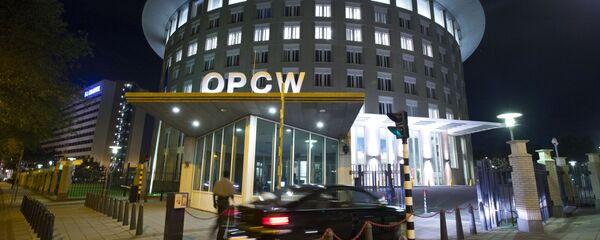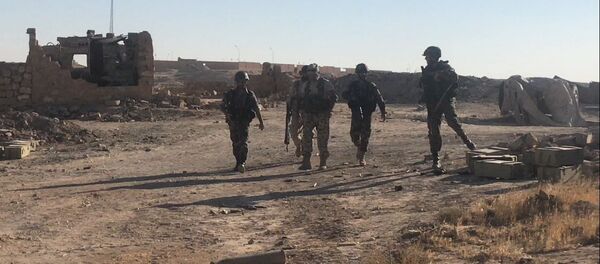WASHINGTON (Sputnik) — Since the Daesh terror group has been driven back in Syria to a small pocket of territory in the middle Euphrates River Valley between the cities of Deir ez-Zor and Abu Kamal, communication between the US and Russian forces in Syria has reached a new level of intensity.
According to the spokesman, both sides maintain two lines of communication to coordinate operations in the air and on the ground, as well as a third direct channel for senior-level officers.
"As the pro-regime forces and our partner force the Syrian Democratic Forces started to move closer to one another, there’s no question that the level of deconfliction had to increase," Dillon said in a phone interview from Baghdad, adding that the lines of communication between the two sides "are often used multiple times throughout the day."
US-Led Coalition Monitors Situation in Idlib
Dillon commented on the situation in the Syrian province of Idlib, which is currently controlled by the Free Syrian Army and other opposition forces that are fighting against government troops.
Dillon said the coalition was monitoring developments in the area, as fighting there could spill into areas where Daesh has been defeated.
The US coalition was neither coordinating with Russian forces nor operating in the area of Idlib, he stressed.
"We are not. So the organization that I represent is strictly focused on the defeat and fighting ISIS [Daesh] so all of the things that are happening in Idlib with al-Nusra and HTS — that is not the coalition who is in that area," Dillon said, referring to the terrorists groups of Nusra Front and Hayat Tahrir al-Sham.
US-Led Coalition Blames Daesh for Decimating Raqqa
The spokesman disputed Sunday's claims by the Russian Defense Ministry that Raqqa was "wiped off the face of the Earth" as a result of US-led raids. Dillon pins the blame for the destruction of the Syrian city on Daesh.
Dillon added that the coalition was the only fighting force in Syria that expends an extraordinary amount of time and resources to avoid civilian casualties and to document each incident that occurs.
Dillon said the coalition investigates every allegation of civilian casualties, many of which turn out to be "unfounded."
As for the devastation wreaked upon Raqqa's infrastructure, Dillon said people tend to forget that the city was ravaged by war waged by multiple parties over a period of more than five years.
In June, a United Nations investigator warned that US coalition bombings in Raqqa were causing "staggering loss of civilian life."
Russian Claims US Blocking Aid Deliveries in Syria ‘Baseless’
The spokesman for the Operation Inherent Resolve also commented on statements by the Russian Defense Ministry that US-led forces and illegal armed groups had blocked the delivery of humanitarian cargo to the Rukban refugee camp in Syria, which is located in Homs province, some 11 miles south of the al-Tanf settlement inside the US-controlled zone on the Syrian-Jordanian border.
"There have been several allegations from the Russian Defense Ministry that have been absolutely false and baseless and this is yet another one. We are absolutely not preventing any aid to the Rukban camp. They are receiving the supplies that they need," Dillon said.
"I know that our partner force in the area are making sure that the aid that is getting there is exactly that, it’s aid and it’s not some nefarious groups or ISIS [Daesh] elements that are trying to conduct any kind of spectacular attacks," Dillon said.
US and Allies Plan New Drive on Remaining Daesh Stronghold at Abu Kemal
Dillon said that US coalition was preparing a new offensive, targeting the Syrian town of Abu Kemal, a district close to the Iraqi border, where it believes to defeat the largest remaining stronghold of Daesh.
"We have to consolidate the gains that the Syrian Democratic Forces have made down to the Omar oil fields [in Deir ez-Zor] and continue to back clear areas that are still ISIS [Daesh]-held territory… and then prepare for an offensive in Abu Kamal, where we believe the bulk of the ISIS [Daesh] leadership remains right now," Dillon said.
Will US Troops Remain After Defeat of Daesh?
Dillon also said that the future of the US-led mission in Iraq and Syria would have to be decided by the administration of President Donald Trump, the Iraqi government and the countries involved in the coalition fighting Daesh.
Dillon added that while the defeat of Daesh's physical presence appears to be within sight, much work remains to be done to combat the group's ideology and online presence.
"Keeping ISIS [Daesh] gone and preventing their resurgence, that will still require some effort by the coalition through our partners," he stated.

